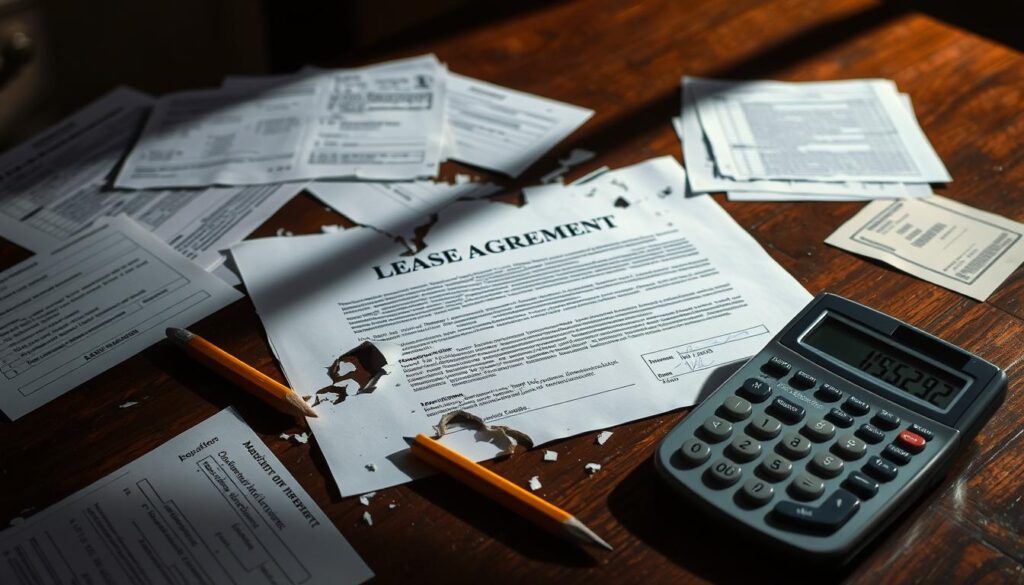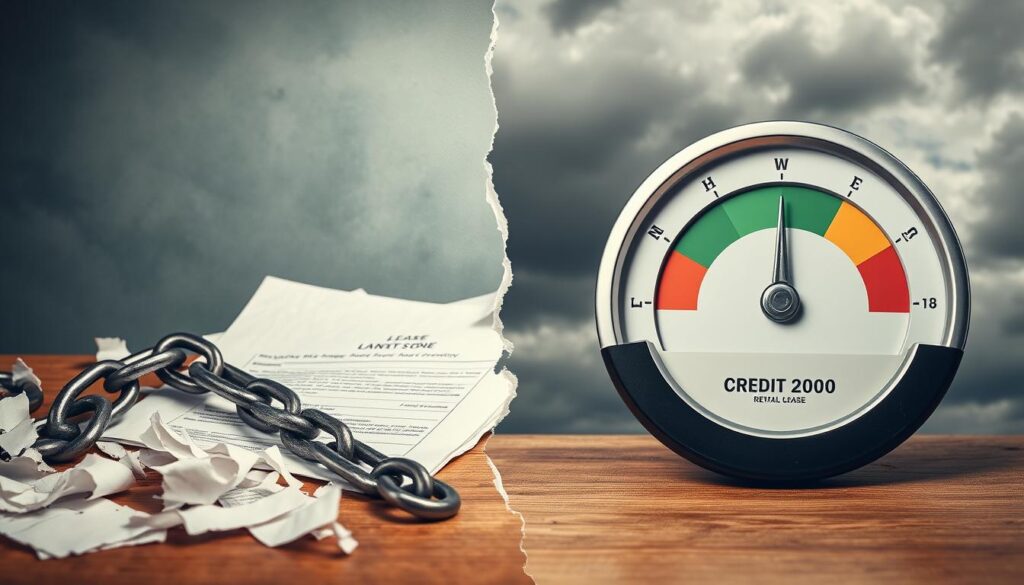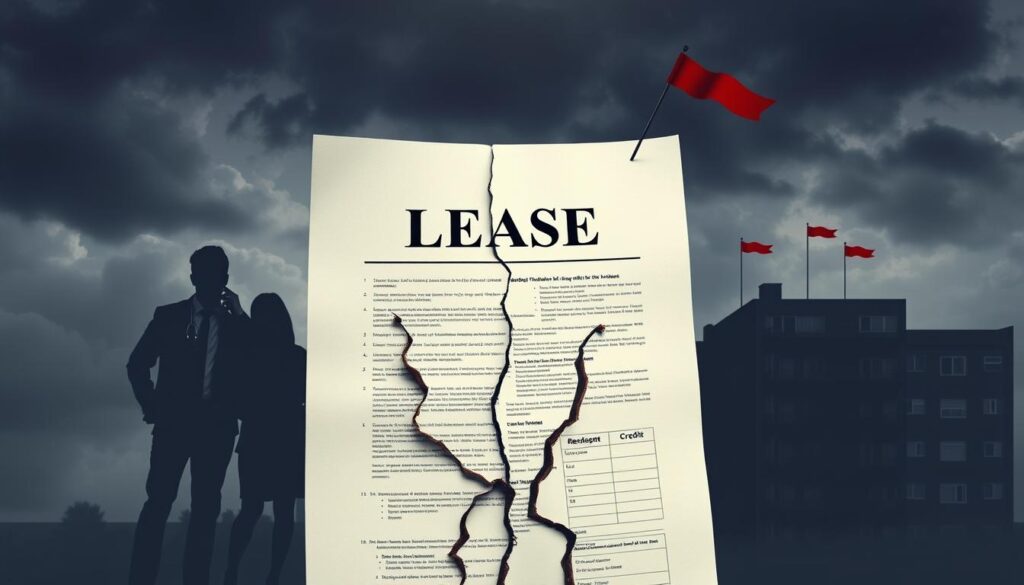Signing a rental lease agreement creates a legal bond between you and your landlord. Breaking this contract can lead to serious consequences. Your credit score might take a hit, affecting your financial future.
A lease outlines terms like duration and payment schedule. Ending it early is a contract breach. This can harm your credit score and cause other problems.
The does breaking a lease hurt your credit, lease termination credit impact, breaking rental contract credit score, early lease termination credit consequences, premature lease exit credit effects, ending lease agreement credit implications, rental lease breach credit ramifications, vacating rental before lease credit damage, defaulting on lease credit rating, lease violation credit history are crucial when considering breaking a lease.
Key Takeaways
- Breaking a lease can have a negative impact on your credit score.
- Lease termination can lead to credit implications, such as lower credit scores and difficulty securing future rentals.
- Early lease termination may result in penalties, fees, and potential legal action from the landlord.
- Carefully review the terms of your lease agreement to understand the consequences of breaking the contract.
- Consider alternative options, such as negotiating with the landlord or finding a suitable replacement tenant, before deciding to break the lease.
Understanding Rental Lease Agreements
A lease agreement is vital for renting property. It outlines rental terms and conditions for tenants and landlords. This contract defines rights and obligations for both parties.
It’s important to understand how lease agreements affect credit. This includes lease termination credit impact, breaking rental contract credit score, and premature lease exit credit effects.
Binding Contract Terms
Rental agreements include binding terms for tenants and landlords. These cover lease length, monthly rent, security deposits, and property use rules.
Failing to follow these terms can have serious consequences. This may include a credit score impact if there’s a premature lease exit.
Tenant and Landlord Obligations
Lease agreements outline specific responsibilities for both parties. Tenants must maintain the property, pay rent on time, and follow rules.
Landlords ensure the property is habitable, make repairs, and follow local housing laws. Understanding these duties helps determine credit implications of breaking a lease agreement.
Reviewing lease agreements helps tenants navigate potential credit impacts. This knowledge aids in making informed decisions about ending leases early.
Understanding agreements can help minimize credit damage from lease termination. It allows tenants to explore alternatives when needed.
Consequences of Prematurely Exiting a Lease
Breaking a rental lease early can lead to serious financial and legal issues. Your credit score may suffer, and you could face hefty penalties. Let’s explore the potential impacts of leaving your rental before the lease ends.
Early lease termination can significantly harm your credit score. Landlords may report breaches to credit bureaus, causing long-lasting damage. This negative mark can remain on your credit history for up to seven years.
Such damage makes it harder to secure future housing or obtain credit. You might also face early lease termination credit consequences. These can include losing your security deposit and paying remaining rent.
Additional fees may cover advertising and re-renting costs. If your landlord takes legal action, you could also incur court fees. The exact vacating rental before lease credit damage depends on your lease terms and state laws.
- Forfeiture of your security deposit
- Payment of remaining rent owed on the lease
- Fees for advertising and re-renting the property
- Potential legal fees if the landlord takes you to court
Review your lease carefully before deciding to break it. Understanding your obligations is crucial to avoid unexpected consequences. Consider seeking legal advice or talking openly with your landlord about your situation.
| Consequence | Description |
|---|---|
| Credit Score Impact | The landlord may report the lease breach to credit bureaus, resulting in a negative mark on your credit report that can stay for up to 7 years. |
| Financial Penalties | You may be required to pay fees such as forfeiture of your security deposit, remaining rent owed, advertising and re-renting costs, and potential legal fees. |
| Difficulty Securing Future Housing | The negative credit history and financial penalties associated with breaking a lease can make it harder to rent or purchase a new home in the future. |
Carefully weigh the consequences of early lease termination before making your decision. Explore alternative options that may be available to you. Open communication with your landlord can help minimize the impact on your credit and finances.
Does Breaking a Lease Hurt Your Credit?
Ending a rental agreement early can impact your credit score. This can make future housing or financial opportunities difficult. Breaking a lease may have serious consequences for your credit history.
Impact on Credit Score
Landlords may report lease violations to credit bureaus. This can negatively affect your credit score. The impact remains even if you’ve paid all outstanding rent and fees.
Credit score damage can last for years. This makes qualifying for loans, credit cards, or new rentals harder.
Reporting to Credit Bureaus
Landlords can report early terminations to Experian, Equifax, and TransUnion. This information may lower your credit score. The impact depends on the breach details and your credit history.
| Scenario | Credit Score Impact |
|---|---|
| Defaulting on lease payments | Significant drop in credit score |
| Breaking rental contract without valid reason | Moderate drop in credit score |
| Negotiating an early lease termination | Minimal or no impact on credit score |
The credit score impact varies based on the lease violation circumstances. Communicate with your landlord proactively. Try to minimize damage to lessen long-term effects on your credit history.

Legally Terminating a Lease Without Penalties
Breaking a rental lease can hurt your credit. But there are times when you can end it legally without penalties. Knowing these reasons can help you protect your credit score.
Valid Reasons for Early Termination
You might be able to end your lease early without penalty in these cases:
- Relocation for a new job or military service, provided the rental agreement allows for early termination in such cases.
- Experiencing domestic violence, harassment, or other safety concerns that make the rental unit uninhabitable.
- Significant and unresolved maintenance issues that the landlord fails to address, rendering the property unsuitable for occupancy.
- A change in family circumstances, such as the need to care for an elderly or ill relative, that requires the tenant to move.
You’ll need to give your landlord written notice. You may also need to provide proof for your claim. Talk to your landlord early and be willing to negotiate.
This can help reduce the ending lease agreement credit implications and rental lease breach credit ramifications. It can also lessen vacating rental before lease credit damage.
| Valid Reason for Early Termination | Required Documentation |
|---|---|
| Job relocation | Letter from employer confirming transfer or new position |
| Domestic violence | Police report or court order |
| Unresolved maintenance issues | Photographs and repair requests made to landlord |
| Family circumstances | Documentation related to care needs |
Know the legal reasons for ending a lease early. Talk to your landlord right away. This can help protect your credit when you need to move out early.
Negotiating an Early Lease Termination
Breaking a rental lease can be scary, especially when thinking about your credit. But you might be able to negotiate an early end with your landlord. This can help protect your credit score and rental history.
To negotiate well, approach your landlord early with a strong case. Review your lease carefully to understand all terms and obligations. Find valid reasons for leaving early, like a job move or unsafe living conditions.
When you meet, explain your situation clearly and suggest a fair solution. Offer a good notice period, pay any rent owed, and maybe compensate the landlord. Your aim is to find a middle ground that helps both parties.
Good communication and a helpful attitude are key in these talks. By working with your landlord, you might reach a deal that lets you move without hurting your credit.
“The key to successfully negotiating an early lease termination is to approach it with a spirit of collaboration and understanding. By finding a mutually acceptable solution, you can protect your credit while also addressing your personal circumstances.”
| Negotiation Strategies | Potential Landlord Concerns |
|---|---|
|
|
Mitigating Credit Damage from Lease Breach
Breaking a lease can hurt your credit rating. But there are ways to lessen the damage. Talk to your landlord and offer compensation to protect your credit history.
Proactive Communication
Contact your landlord as soon as you know you need to end your lease early. Be honest about your situation. Show that you’re willing to find a solution together.
This approach proves you’re responsible and acting in good faith. It may reduce the credit ramifications of a lease violation.
Offering Compensation
- Propose to pay any outstanding rent or fees owed up to the date of your planned departure.
- Offer to assist in finding a new tenant to take over the remainder of the lease, which can help minimize the landlord’s financial loss.
- Consider paying an early termination fee, if stipulated in the lease agreement, to facilitate an amicable parting.
A proactive approach can help protect your credit rating during a rental lease breach. Open communication is crucial. Work with your landlord to find a solution that benefits both of you.

Rental History and Future Prospects
Breaking a lease affects more than just your credit history. It can harm your rental history too. This poses challenges when applying for new rentals in the future.
Lease violations and defaults raise red flags for landlords. They may hesitate to approve your rental application. Landlords often do thorough background checks on potential tenants.
A history of lease violation or credit issues can work against you. Landlords might see you as a high-risk tenant. They may think you’re likely to break future lease agreements.
Some landlords might reject your application outright. Others may ask for bigger security deposits. In some cases, they may refuse to rent to you at all.
This can limit your housing options significantly. Finding a new place becomes harder, especially in competitive rental markets.
“A history of lease violations can haunt you for years, making it harder to secure your next rental property. Landlords tend to be cautious when it comes to tenants with a checkered rental past.”
To lessen the long-term impact, address lease violations promptly. Strive to maintain a positive rental record. Talk to your current landlord and offer to make amends.
Consider seeking legal advice to resolve issues. This can prevent permanent marks on your rental history.
Take steps to protect your rental history. This improves your chances of getting preferred rentals later. It helps avoid problems from a lease violation credit history or defaulting on a lease credit rating.
Preventing Lease Violations Credit Ramifications
Avoiding negative credit impacts from lease violations is crucial. This section offers tips on planning and understanding lease terms. These strategies help fulfill rental obligations and avoid credit history issues.
Careful Planning
Review the lease agreement thoroughly before signing. Be aware of lease length, early termination penalties, and tenant responsibilities. Plan ahead to commit to the full lease term.
This approach helps prevent credit damage from early rental vacating. It also maintains a positive credit history.
Understanding Lease Terms
Read and understand the entire lease agreement. Focus on rent payments, security deposits, and property maintenance clauses. Know your rights and responsibilities as a tenant.
This knowledge helps fulfill obligations and avoid potential credit history problems. It’s key to maintaining a good rental record.
| Key Lease Terms to Understand | Potential Consequences of Violation |
|---|---|
| Rent Payment Schedule | Late payments or non-payment can negatively impact your credit score. |
| Security Deposit | Failure to properly maintain the property or pay for damages can result in a partial or full forfeiture of the deposit. |
| Early Termination Clause | Breaking the lease prematurely can lead to penalties, including rental lease breach credit ramifications. |
Careful planning and understanding lease terms are essential. These actions help prevent credit damage from early rental vacating. They also protect your credit score and rental history.
Protecting Your Credit While Renting
Renting can be tricky, but safeguarding your credit is crucial. A strong credit profile matters for all renters. Smart renting habits protect your lease violation credit history and prevent defaulting on lease credit rating issues.
Paying rent on time is key to protecting your credit. Late payments can hurt your credit score. Landlords might report missed payments to credit bureaus.
Talk to your landlord if you foresee payment problems. Open communication can help find solutions.
- Set up a reliable system for timely rent payments.
- Discuss financial difficulties with your landlord proactively.
- Know your lease terms and tenant responsibilities.
A positive rental history also shields your credit. Avoid lease violations like property damage or noise complaints. These can be reported and impact your credit rating.
| Best Practices for Protecting Credit While Renting | Potential Consequences of Lease Violations |
|---|---|
|
|
Following these practices helps you rent confidently and protect your credit. Avoid lease violation and defaulting on lease issues. A solid credit profile benefits you now and opens future housing opportunities.

Evaluating Alternative Housing Options
If early lease termination is unavoidable, explore other housing options. These alternatives may be cheaper and less harmful to your credit. Financial factors play a key role in this decision.
Financial Considerations
Weigh the costs and impacts of different housing choices carefully. Consider these important factors:
- Upfront costs: Comparing security deposits, application fees, and any other initial expenses
- Monthly rent or mortgage payments: Evaluating the long-term financial commitment
- Utilities and other living expenses: Ensuring the overall cost of living fits within your budget
- Potential impact on credit implications from ending a lease agreement: Considering the credit consequences of early lease termination
A thorough analysis of housing options’ financial aspects is crucial. This helps you make an informed choice.
Balance your immediate needs with long-term effects on your credit and finances. This approach leads to better decision-making.
“Carefully evaluating the financial implications of different housing choices is crucial when faced with the need to terminate a lease prematurely.”
Find a solution that meets your housing needs and minimizes credit implications. Consider all financial factors for long-term stability.
Your decision can set you up for future financial success. Choose wisely to protect your credit and overall financial health.
State Laws on Lease Termination
Understanding state laws on ending lease agreements is vital to manage credit implications. Each state has unique rules for rental lease breaches. These laws affect both tenants and landlords differently across the United States.
State regulations dictate rights for ending a lease early. Some states protect tenants, while others favor landlords. This difference can lead to varying credit consequences for tenants.
- In California, tenants can end leases early if they’re victims of domestic violence, sexual assault, or stalking.
- Texas requires tenants to give 30 days’ notice and pay fees. This could negatively impact their credit history.
Knowing your state’s lease termination laws is crucial. It helps you make informed decisions about breaking a rental agreement. Staying updated on local laws can protect your finances.
“Knowledge of the law is the first step in managing the credit implications of a rental lease breach.”
Landlord Rights in Case of Lease Breach
Landlords have legal rights when tenants break rental agreements. These rights are important for tenants to understand. They help navigate possible outcomes of rental lease breach credit ramifications and vacating rental before lease credit damage.
Potential Legal Action
If a tenant breaks lease terms, the landlord may take legal steps. These can include:
- Filing a lawsuit to recover unpaid rent or damages
- Reporting the lease violation to credit bureaus, which can negatively impact the tenant’s credit score
- Pursuing an eviction process to remove the tenant from the property
These actions can seriously affect a tenant’s finances. They may face rental lease breach credit ramifications. Future housing or credit-based services could become harder to get.
| Legal Action | Potential Consequences for Tenant |
|---|---|
| Lawsuit for Unpaid Rent or Damages | Financial liability, court fees, potential wage garnishment |
| Reporting to Credit Bureaus | Negative impact on credit score, difficulty obtaining future rentals or loans |
| Eviction Process | Removal from the property, additional legal fees, public record of eviction |
Tenants must know their lease rights and duties. This knowledge helps avoid rental lease breach credit ramifications. It also prevents vacating rental before lease credit damage.

Rebuilding Credit After a Lease Violation
A lease violation can hurt your credit history. But don’t worry, you can rebuild your credit rating over time. Understanding the process and using effective strategies will help you recover.
Start by reviewing your credit report. Find the lease-related issues affecting your score. Then, make a plan to address these problems step by step.
- Communicate with the landlord: Talk to your previous landlord about a solution. Try to make a payment plan or reach a settlement. Resolving this issue can help reduce long-term credit impacts.
- Dispute inaccurate information: Check your credit report for errors about the lease violation. If you find any, dispute them with credit bureaus. Fixing mistakes can improve your credit profile.
- Develop a debt repayment strategy: Create a plan to pay off any lease-related balances or fees. Consistent, on-time payments will help rebuild your credit gradually.
- Limit new credit applications: Avoid applying for new credit cards or loans while rebuilding. Each application can result in a hard inquiry, affecting your score.
Overcoming lease violation credit history challenges takes time and effort. Stay patient and disciplined in your approach. With these steps, you’ll be on track to improve your credit profile.
Best Practices for Responsible Renting
Adopting responsible renting habits is crucial to protect your credit. Understanding your lease, communicating with your landlord, and paying rent on time are key. These actions safeguard your credit history and ensure a smooth rental experience.
Carefully reviewing your lease agreement is a vital step. Understand the binding contract terms, including lease length and termination policies. This knowledge helps you make informed decisions and avoid unintended lease violation credit history.
- Thoroughly review the lease terms and understand your obligations as a tenant.
- Communicate openly with your landlord about any concerns or changes in your situation.
- Make timely rent payments to maintain a positive rental history and credit standing.
Open communication with your landlord can help prevent credit issues. If you foresee challenges fulfilling your lease, talk to your landlord. Work together to find solutions, like negotiating early termination or subletting.
| Best Practices | Benefits |
|---|---|
| Thoroughly review lease terms | Understand your obligations and avoid unintended lease violation credit history |
| Communicate openly with landlord | Collaborate to find solutions and mitigate rental lease breach credit ramifications |
| Make timely rent payments | Maintain a positive rental history and credit standing |
These best practices help you navigate renting responsibly. They protect your credit from potential consequences of vacating rental before lease credit damage. Responsible renting benefits your housing situation and your long-term financial well-being.
Conclusion
Breaking a rental lease can harm your credit score and finances. Understanding the impact and exploring legal options can help minimize damage. This overview empowers you to make informed decisions and maintain financial stability.
Early lease termination affects credit scores, rental history, and future housing prospects. Knowing these consequences allows you to take steps to mitigate damage. You can then work on rebuilding your credit.
We’ve examined how breaking a lease hurts credit and potential credit bureau reporting. Legal options for penalty-free termination were also discussed. Communication with your landlord is crucial in these situations.
Strategies for rebuilding credit after a lease violation were provided. By applying these insights, you can better handle lease termination challenges. This approach helps protect your financial well-being.

